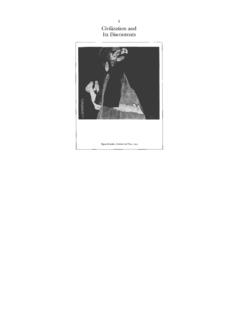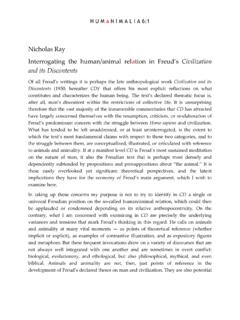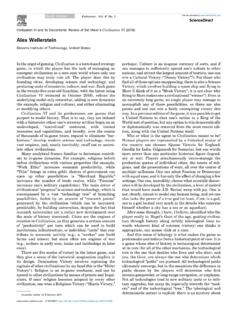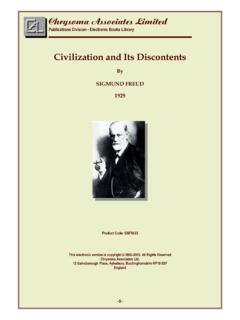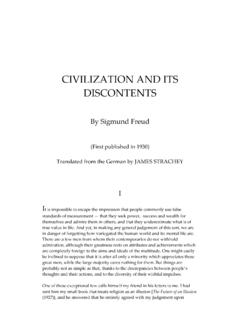Transcription of Freud, Civilization and its Discontents
1 Freud, Civilization and its Discontents !Arts One, UBC! January 12, 2015!Christina Hendricks!Slides licensed CC BY !Repetition Compulsion! In Civilization (1930), pp. 30 (Part III), 55 (Part VI)! Beyond the Pleasure Principle (1920): a compulsion to repeat unpleasant or traumatic experiences ( , dreams of a trauma in war neuroses ; we might say PTSD today)! This is yet another text that shows us our present, our Civilization in an unflattering light ( , Rousseau, Nietzsche)! do we have a compulsion to repeat such arguments (or just to assign them to you)?
2 !Outline for today!1. Background to help make sense of the text !2. Our Discontents with Civilization ; repetitions of other philosophers we ve read!3. Repetition of the beginning in the end of the text!Sigmund Freud, 1856-1939!Circa 1905 1921 Wikimedia commons, public domainWikimedia commons, public domainSome important terms!Instinct, drive!An impulse that originates in the body and is transferred to the mind; drives actions! instincts are the representatives of all the forces originating in the interior of the boy and transmitted to the mental apparatus (Beyond the Pleasure Principle (1920))!
3 There are numerous instincts: , sexual, nutritive, self-preservation, aggression/death instinct!Libido! The energy attached to sexual instincts! On the exact analogy of hunger , we use libido as the name of the force (in this case that of the sexual instinct, as in the case of hunger that of the nutritive instinct) by which the instinct manifests itself. (Introductory Lectures on Psychoanalysis (1917))! Can be sublimated (next slide)!Sublimation! The capacity to exchange the originally sexual aim for another which is no longer sexual but psychically related to the first is called the capacity for sublimation ( Civilization 90 (in Civilized Sexual Morality essay this essay is not in your version of the text)).
4 ! directing the instinctual forces away from their sexual aim and towards higher cultural goals (Ibid. 95)! , aim-inhibited libido can reinforce the communal bonds (of Civilization ) with ties of friendship ( Civilization 46 (Part V))! , can change the aim of libido so that one directs love not to individuals, but to everyone in equal measure ; having a readiness to love mankind and the world in general (Civiliz. 38 (Part IV)!Unconcious, preconscious, conscious!Conscious!Preconscious!Unconsc ious!Freud s topographical model; like an icebergCensorrepressionreturn of !)
5 The repressed!Id, Ego, Super-ego! Structural-Iceberg, !Wikimedia Commons,!public domain!Censorrepression The space occupied by the unconscious id ought to have been incomparably greater than that of the ego or the preconscious (70).!Freud s picture from !New Introductory !Lectures on !Psychoanalysis, !lecture 31 (1933)!Eros and Thanatos!Life Instinct: Eros! Self-preservation, self-assertion, mastery (Beyond the Pleasure Principle (1920)! Unification! Eros, by bringing about a more and more far-reaching combination of the particles into which living substance is dispersed, aims at complicating life and at the same time.)
6 At preserving it (Ego and Id 38).! the drive to preserve the living substance and bring it together in ever larger units ( Civilization 55 (Part VI))! Also includes sex drive as part of bringing individuals together!Death Instinct: Thanatos! Drive to return to the inanimate state death! Breaking apart: a drive that seeks to break down these units [formed by Eros] and restore them to their primordial organic state (Civiliz 55 (Part VI))! Aggressive drives! against self: super-ego and guilt, masochism! can also turn it against others & the world ( , drive to destruction, cruelty, sadism)!
7 Posits death drive partly from compulsion to repeat traumatic experiences (Beyond the Pleasure Principle (1920))!Breaking glass, flickr photo by GabPRR, licensed CC- BY Life as Struggle! the struggle between Eros and death, between the life drive and the drive for destruction .. is the essential content of all life ( Civilization 58 (end of Part VI))! Civilization and Discontents !Title of book! Unclarity of Civilization and its Discontents ! German: unease, malaise, discomfort in Civilization (Translator s Preface, xxv)!
8 Suggested English translation: Man s Discomfort in Civilization !pp. 24-25; sect. IV! Discontents !1. If Civilization imposes such great sacrifices not only on man s sexuality, but also on his aggressivity, we are in a better position to understand why it is so hard for him to feel happy in it (51 (Part V))!2. Individual and cultural super-egos make demands that we can t fulfill; require us to control id further than is possible (79 (Part VIII)).!3. The result is guilt, and the sense of guilt .. [is] the most important problem in the development of Civilization and.
9 The price we pay for cultural progress is a loss of happiness, arising from a heightened sense of guilt (71 (beginning of Part VIII)).!Intro to these Discontents : Freud & Plato!Freud and Plato: the self/psyche and the community! Plato: 3 analogous parts; justice is the same in both! Freud: ! similar aims of processes of Civilization and development of individual: the one being to create a unified mass consisting of many individuals, the other to integrate the individual into such a mass (76 (Part VIII))! struggle of eros & death drive in both the individual and the community (75 (Part VIII))!
10 Super-ego in community: ethics (78-79 (Part VIII))!Freud and Plato: unity in community & psyche!Plato: state should be unified; avoid civil war! psyche should harmonize the parts of self!Freud on unity in psyche ego tries to bring about harmony among the forces and influences working in and upon it (New introductory Lectures (1933) 69)! An action by the ego is as it should be if it satisfies simultaneously the demands of the id, of the super-ego and of reality that is to say, if it is able to reconcile their demands with one another (An Outline of Psychoanalysis (1938) 15)!

